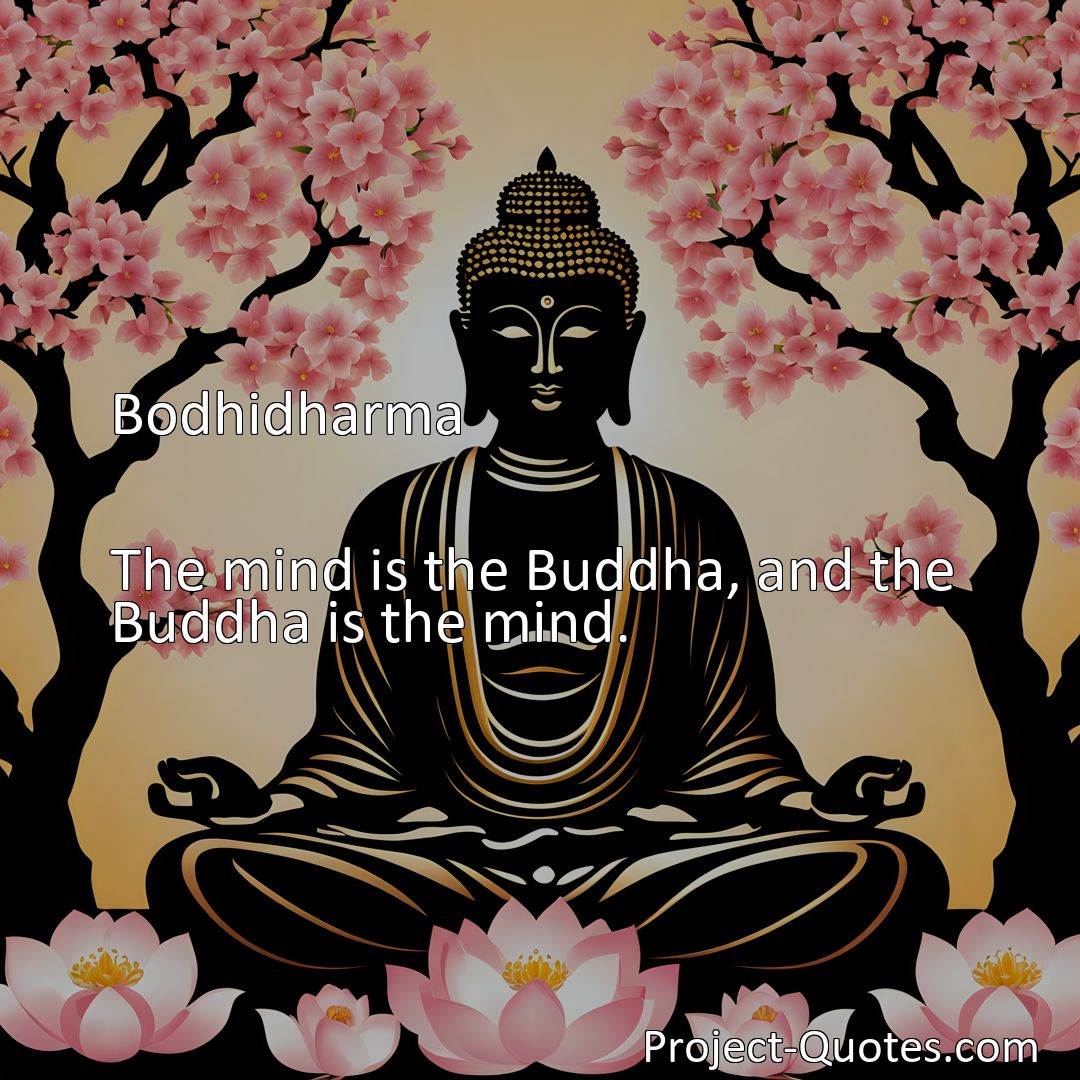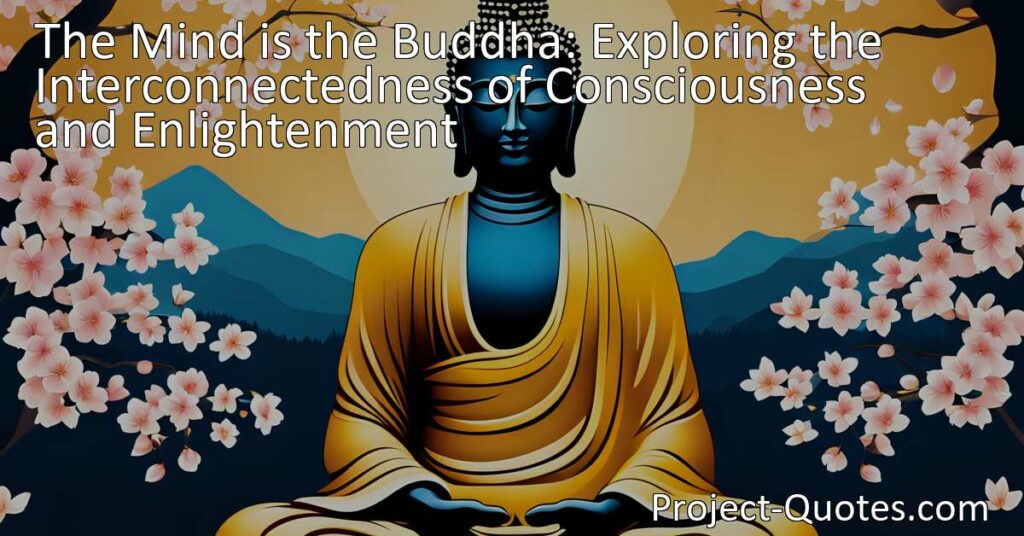The mind is the Buddha, and the Buddha is the mind.
Bodhidharma
The quote “The mind is the Buddha, and the Buddha is the mind” invites us to explore the interconnectedness of our consciousness and the enlightened state of being. It emphasizes that the potential for awakening and enlightenment exists within each of us, challenging the notion that it is unattainable. By cultivating mindfulness, meditation, and a deep sense of interconnectedness, we can recognize and actualize our innate Buddha nature for a life of peace, clarity, and liberation.
Table of Contents
Meaning of Quote – The mind is the Buddha, and the Buddha is the mind.
The mind is the Buddha, and the Buddha is the mind. These profound words hold a wealth of wisdom and insight, inviting us to explore the interconnectedness of our mind and the enlightened state of being. This quote originates from Zen Buddhism, a spiritual tradition that emphasizes the direct experience of enlightenment rather than relying solely on scriptures or teachings. In this article, we will delve into the meaning behind this quote and examine how it can guide us towards a deeper understanding of ourselves and the nature of reality.
To grasp the essence of the mind being the Buddha and the Buddha being the mind, it is important to first understand what these terms represent. In Buddhism, the term “mind” refers not only to our thoughts and emotions but also to our consciousness, awareness, and our fundamental essence as sentient beings. It is the aspect of ourselves that experiences and perceives the world around us.
On the other hand, the term “Buddha” refers to a state of awakened or enlightened consciousness. It represents the ultimate potential within each of us to transcend suffering and ignorance, and to experience a profound realization of truth and liberation.
When we say that the mind is the Buddha, we are acknowledging that the potential for awakening and enlightenment exists within each and every one of us. It is not limited to a select few or reserved for those who follow a particular spiritual path. This understanding challenges the notion that enlightenment is something external or unattainable. Instead, it suggests that the key to awakening lies within our own minds.
Similarly, when we say that the Buddha is the mind, we recognize that the awakened state of consciousness is inseparable from the mind itself. It is not a separate entity or an external force that acts upon us. Rather, the Buddha nature is an intrinsic part of our being, waiting to be realized.
In essence, this quote reminds us that we have the potential to awaken and experience profound spiritual transformation right here and now. It invites us to look within and explore the depths of our own minds, understanding that true liberation and enlightenment are not distant goals but inherent qualities of our consciousness.
To fully embrace the idea that the mind is the Buddha and the Buddha is the mind, we must cultivate mindfulness and awareness in our everyday lives. Mindfulness involves paying attention to our thoughts, emotions, and sensations in a non-judgmental way. It means being fully present and engaged in the present moment, rather than getting lost in regrets about the past or worries about the future.
By practicing mindfulness, we can start to break free from the habitual patterns of our minds and gain insight into the nature of our own consciousness. We begin to recognize the impermanence and interconnectedness of all things, as well as the illusory nature of our thoughts and beliefs. This self-inquiry helps us to see through the veils of illusion and recognize the inherent wisdom and compassion that lie at the core of our being.
In addition to mindfulness, meditation is a powerful tool for deepening our understanding of the mind and the nature of enlightenment. Through meditation, we learn to quiet the incessant chatter of our thoughts and create a space for insight and clarity to arise. By observing the mind with non-attachment, we cultivate a sense of spaciousness and detachment from our mental formations.
As we delve deeper into our meditation practice, we may start to catch glimpses of the Buddha nature within ourselves. It may manifest as moments of clarity, peace, and profound insight. These glimpses serve as reminders that the awakened state of consciousness is not an abstract concept but a tangible experience that can be accessed and cultivated through dedicated practice.
Furthermore, this quote teaches us that there is no separation between our ordinary, everyday mind and the enlightened mind of the Buddha. We do not need to reject or transcend our ordinary experiences in order to access our Buddha nature. Instead, we are called to fully embrace and integrate all aspects of our being, including our thoughts, emotions, and physical sensations.
By seeing our ordinary mind as inherently pure and free, we release the need to fix, change, or transcend it. We start to recognize that every moment, every thought, and every emotion has the potential to be a teacher and a gateway to awakening. This understanding frees us from the trap of seeking enlightenment outside of ourselves and allows us to fully engage with the richness of our human experience.
Moreover, this quote encourages us to recognize the interconnectedness of all beings and the world around us. It reminds us that our minds are not separate and isolated entities but rather interconnected with the collective consciousness of humanity and the entire universe. When we cultivate a deep sense of interconnectedness, we naturally develop compassion and empathy towards all living beings and become more committed to creating a just, harmonious, and sustainable world.
In conclusion, the quote “The mind is the Buddha, and the Buddha is the mind” opens up a profound exploration into the nature of our consciousness and the potential for enlightenment. It invites us to awaken to the truth that the seeds of wisdom and compassion are already present within our own minds. By practicing mindfulness, meditation, and cultivating a deep sense of interconnectedness, we can recognize and actualize our innate Buddha nature. May this understanding guide us towards a life of greater peace, clarity, and liberation.
Freely Shareable Quote Image
I hope this quote inspired image brings you hope and peace. Share it with someone who needs it today!


